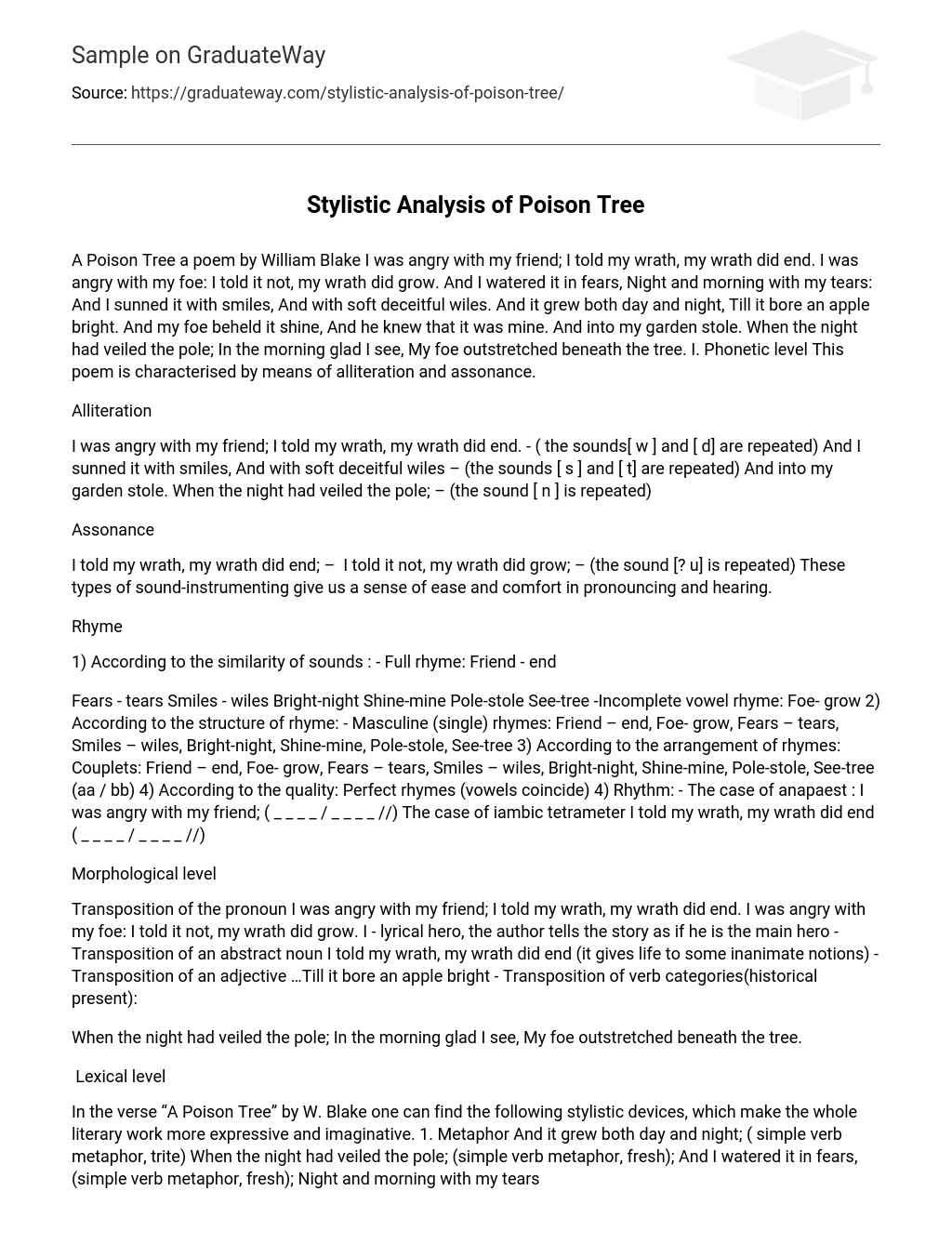A Poison Tree a poem by William Blake I was angry with my friend; I told my wrath, my wrath did end. I was angry with my foe: I told it not, my wrath did grow. And I watered it in fears, Night and morning with my tears: And I sunned it with smiles, And with soft deceitful wiles. And it grew both day and night, Till it bore an apple bright. And my foe beheld it shine, And he knew that it was mine. And into my garden stole. When the night had veiled the pole; In the morning glad I see, My foe outstretched beneath the tree. І. Phonetic level This poem is characterised by means of alliteration and assonance.
Alliteration
I was angry with my friend; I told my wrath, my wrath did end. – ( the sounds[ w ] and [ d] are repeated) And I sunned it with smiles, And with soft deceitful wiles – (the sounds [ s ] and [ t] are repeated) And into my garden stole. When the night had veiled the pole; – (the sound [ n ] is repeated)
Assonance
I told my wrath, my wrath did end; – I told it not, my wrath did grow; – (the sound [? u] is repeated) These types of sound-instrumenting give us a sense of ease and comfort in pronouncing and hearing.
Rhyme
1) According to the similarity of sounds : – Full rhyme: Friend – end
Fears – tears Smiles – wiles Bright-night Shine-mine Pole-stole See-tree -Incomplete vowel rhyme: Foe- grow 2) According to the structure of rhyme: – Masculine (single) rhymes: Friend – end, Foe- grow, Fears – tears, Smiles – wiles, Bright-night, Shine-mine, Pole-stole, See-tree 3) According to the arrangement of rhymes: Couplets: Friend – end, Foe- grow, Fears – tears, Smiles – wiles, Bright-night, Shine-mine, Pole-stole, See-tree (aa / bb) 4) According to the quality: Perfect rhymes (vowels coincide) 4) Rhythm: – The case of anapaest : I was angry with my friend; ( _ _ _ _ / _ _ _ _ //) The case of iambic tetrameter I told my wrath, my wrath did end ( _ _ _ _ / _ _ _ _ //)
Morphological level
Transposition of the pronoun I was angry with my friend; I told my wrath, my wrath did end. I was angry with my foe: I told it not, my wrath did grow. I – lyrical hero, the author tells the story as if he is the main hero – Transposition of an abstract noun I told my wrath, my wrath did end (it gives life to some inanimate notions) – Transposition of an adjective …Till it bore an apple bright – Transposition of verb categories(historical present):
When the night had veiled the pole; In the morning glad I see, My foe outstretched beneath the tree.
Lexical level
In the verse “A Poison Tree” by W. Blake one can find the following stylistic devices, which make the whole literary work more expressive and imaginative. 1. Metaphor And it grew both day and night; ( simple verb metaphor, trite) When the night had veiled the pole; (simple verb metaphor, fresh); And I watered it in fears, (simple verb metaphor, fresh); Night and morning with my tears: And I sunned it with smiles( simple verb metaphor, trite). I told my wrath Till it bore an apple bright
When the night had veiled the pole I told it not, my wrath did grow * Personification …my wrath did end And it (wrath) grew both day and night, Till it bore an apple bright. When the night had veiled the pole; … my wrath did grow * Symbols: … Till it bore an apple bright – in this case “an apple” is the symbol of grievance or malice 2. Epithet- (affective epithet) And with soft deceitful wiles; (fresh, simple, used in pair) …Till it bore an apple bright 3. Oxymoron And with soft deceitful wiles – fresh, adjective + adjective (the meanings of the two components are opposite in sense) . Periphrasis Till it bore an apple bright (I think, an apple – is something like a evil or grievance) – imaginative periphrasis, fresh
Syntactical level
- Inversion I told it not, my wrath did grow . In the morning glad I see . And into my garden stole. …Till it bore an apple bright
- Detachment I told my wrath, my wrath did end. ( emotional colouring) I told it not, my wrath did grow. ( emotional colouring) And into my garden stole. And I watered it in fears, Night and morning with my tears
- Parallel constructions: “And I watered… And I sunned”,
- Anaphora: “I was angry… I was angry”, “I told… I told”,
- Attachment: “And I watered it in fears”… “And I sunned it with smiles, And with soft deceitful wiles. And it grew both day and night”, “And my foe beheld it shine, And he knew that it was mine. And into my garden stole”.
- Asyndeton: I was angry with my friend; I told my wrath, my wrath did end. I was angry with my foe: I told it not, my wrath did grow. When the night had veiled the pole; In the morning glad I see, My foe outstretched beneath the tree.
- Climax (gradation) – logical climax And into my garden stole. When the night had veiled the pole.





